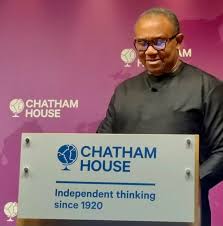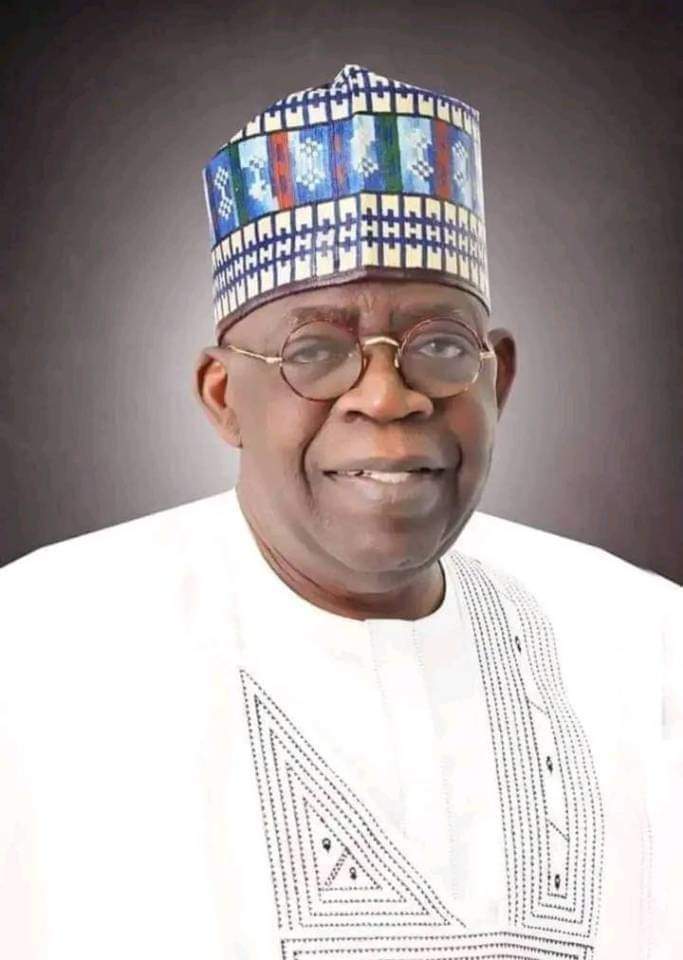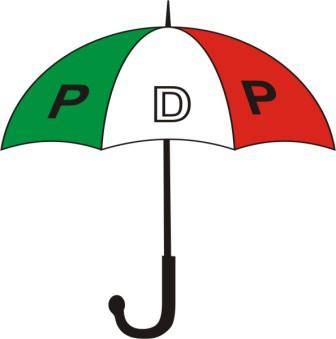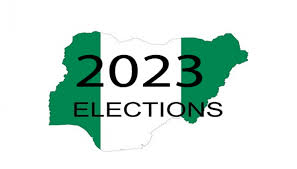***Evolve strong institutions
The Labour Party policy thrust is to change the narrative by raising the quality of life the average Nigeria and reduce poverty thereby returning the country to a place of strategic relevance among the comity of nations, the presidential candidate of the party Peter Obi has indicated
Obi who spoke at Chatham House in London on Monday said by so doing a world that needs a thriving and well governed Nigeria stabilizing the continent of Africa, will be a high value add for a planet imperilled by environmental challenges, terrorism and inequity.

“I also plan here to speak on institutions and how the leadership we offer can facilitate the evolution of stronger institutions, with the rule of law a key anchor of Nation building in Nigeria.
“I have no doubt that the policy choices we favour, and the strong institutions Labour Party will facilitate, will move Nigeria from a country of rent seekers sharing Oil receipts and consuming conspicuously, to one that produces, based on vast factor endowments whose value chains can move us towards a high employment economy. “He said his government will turn the youth bulge to a demographic dividend, rather than today’s harvest of a time bomb of violence and insecurity from the uneducated, unemployed and marginalized.
“This forms the first and most important thrust of my governance priorities without which the rest may not be achieved: “To secure Nigeria, end banditry and insurgency, and unite our dear nation to manage our diversity, such that no one is left behind”.
“The growing insecurity in Nigeria is not because the enemy is formidable, it is rather because of lack of focused leadership, ineffective security governance structure and poor coordination from the centre.
“All these need to be addressed by first, projecting strong leadership signals that allow both state and non-state actors to be mobilised around a single vision.
“Then, by pursuing a robust reform of the security governance structure with a strong coordinating mechanism that assures that all levels of government – federal, state, and local (with 3-level policing structure) – are aligned with strong collaboration with partners from both the private sector and development groups to provide the required services and deliver results for every Nigerian.
“Once this is done, it is also important to have a single, clear, coherent, and consistent communication system to keep the government accountable, citizens engaged and involved in the development process.
“It is important for institutions to be able to provide strong leadership, coordination capability, partner and engage collaboratively with all relevant stakeholders in an environment that mutually reinforces values.
“The second plank of my policy thrust is to “Shift emphasis from consumption to production by running a production-centered economy that is driven by an agrarian revolution and export-oriented industrialization”.
He said with about 70 million hectares of arable land, his administration will pursue an agricultural revolution through proper segmentation of Nigeria to activate and harness the factor endowments of different parts of the country for both rapid and mechanized agricultural development and as a pillar for Nigeria’s other sectoral development and industrialization.
“We will incentivise and invest in agro-cluster and industrial cluster development across our geo-resource zones to take advantage of agglomeration and scale effects particularly in North-West, North-East and North-Central regions of Nigeria. “We will dredge both Rivers Niger and Benue, build dams and massively support the planting of economic trees across the country for local usage, poverty elimination, export and revenue generation.
“A key task is to sequentially but decisively, dismantle the inefficient and anti-market distortionary structures restraining the Nigerian economy from creating the preconditions for a dynamic pro-market economy.
“We will employ entrepreneurial governance to dismantle impediments to free trade and ease of doing business and implement radical economic policies that will drastically reduce our debt service – a major drain on government revenue today. “Our Micro, Small and Medium Scale Enterprises (MSMEs) will be robustly supported. Further borrowing will be strictly for productive purposes.
“While we will aggressively pursue the activation of all opportunities in the oil and gas value chain, we will use targeted incentive schemes that will be professionally administered to diversify our non-oil export portfolio with proper consideration and management of climate change risks and opportunities.
He said, the third pillar of his governance priorities is to “Restructure the polity through effective legal and institutional reforms to entrench the rule of law, aggressively fight corruption, reduce cost of governance, and establish an honest and efficient civil service”. “Reducing the cost of governance in Nigeria is an effective way to fight institutional corruption.
In addition he said reducing cost of governance and streamlining government operations for efficiency and effectiveness, his administration will ensure that reforms are pursued in a way that protects the livelihood of the hardworking and efficient civil servants.
“Critical to fighting corruption, we shall install a new budgeting system founded on the cardinal principles of public accountability, objective setting, and program implementation. “This is against the extant budgetary principles of revenue mobilization, expenditure allocation, borrowing without emphasis on monitoring, evaluation, and feedback.
“We will enforce the principle of performance auditing and institutionalize monitoring and evaluation process of the entire public service delivery as the primary means of actualizing our vision of a new Nigeria.
“This reform will institutionalize the personal involvement of the President in setting budgetary objectives of MDAs, and monitoring and evaluating the implementation process through the Office of Regulatory Review in the Office of the President. Budget monitoring and evaluation capacity will be strengthened within the Presidency.
He said his government will embark on effective macro-economic and fiscal restructuring to quickly restore fiscal viability by discontinuing unaffordable subsidies which have left a black-hole in government finances.
“Fiscal and monetary policy will be properly coordinated, with each deploying conventional tools transparently instead of distorting markets to favour a few privileged persons.
“For the avoidance of doubt, we will collaborate with the Central Bank of Nigeria for the transparent liberalization of the foreign exchange market and the dismantling of the opaque multiple exchange rate regime which effectively subsidizes a few privileged persons.
“We will also seek to boost the supply side, rather than continuing to concentrate exclusively on demand management of the foreign exchange market. When unaffordable subsidies are removed, some carefully calibrated transfers will be used to cushion any adverse impact on the economically weak.
“If the competitiveness of a sector is to be enhanced, then that will be done via the enactment of transparent and specially targeted fiscal and trade policies designed to stimulate investment and growth.
“Revenue shortfalls and leakages such as oil theft will be dealt with decisively by holding persons in positions of authority fully accountable.
Fourthly he said his government will “Leapfrog Nigeria into the 4th Industrial Revolution through the application of scientific and technological innovations to create a digital economy”.
Building on the gains of the agriculture-led manufacturing and export, he said the administration will pursue the development of knowledge and skills to leverage on the emerging disruptive digital technologies, automation, Internet of Things (IoT), artificial intelligence, robotics, virtual reality, block chain technology, biotechnology and data science – all of which are at the heart of the fourth industrial revolution.
He promised to “Build expansive infrastructure for efficient power supply, rail, road and air transportation, and pipeline network, through integrated public-private partnerships, and entrepreneurial public sector governance”.
“Our solution to the perennial power problem in Nigeria is a comprehensive one that covers transmission, distribution, generation and financing as detailed in our Manifesto.
“However, we will immediately complete the $2.3b Nigeria-Siemens network improvement deal to achieve 7,000 MW stable capacity by the end of this year (2023), 11,000 megawatts by 2024, and 25,000 megawatts by 2025.
“We will support local manufacturing capacity of power technologies and encourage and expand local R&D in universities, training centres, and workshops through which many jobs will be created.
Our 6th priority programme is to “Enhance the human capital of Nigerian youths for productivity and global competitiveness through investment in education and research, quality healthcare, and entrepreneurship education”. The World Bank’s Human Capital Development Index ranks Nigeria 168 out of 173 countries. To move Nigeria right to the top bracket of the index, we will pursue a Marshall plan-type programme on education that incorporates compulsory technical and vocational skills, sports, entrepreneurship, programming, and digital skills from the primary to the secondary level.
According to him, In line with this commitment to transform our educational sector, we will prioritize the funding of this critical sector. Our tertiary institutions will be remodelled to serve as hubs or centres for research, development, and commercialisation of ideas for the quick industrialization of Nigeria.
“Finally, our 7th priority is to “Conduct an afro-centric diplomacy that protects the rights of Nigerian citizens abroad and advances the economic interests of Nigerians and Nigerian businesses in a changing world”.




